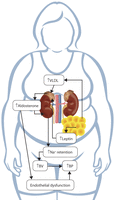Obesity, hypertension and aldosterone: is leptin the link?
- 1Department of Family Medicine, Medical College of Georgia at Augusta University (formerly Georgia Regents University), Augusta, Georgia, USA
- 2Charlie Norwood VA Medical Center, Augusta, Georgia, USA
- 3Department of Physiology, Medical College of Georgia at Augusta University (formerly Georgia Regents University), Augusta, Georgia, USA
- Correspondence should be addressed to W B Bollag; Email: wbollag{at}augusta.edu
-
Figure 1
Obesity increases blood pressure. Excess fat deposits (including those surrounding the adrenal glands) of obese individuals secrete large amounts of leptin. The data of Belin de Chantemele and coworkers indicate that this adipose-derived leptin can stimulate zona glomerulosa cells of the adrenal gland to produce aldosterone. Aldosterone, in turn, causes the kidney to retain salt and water, raising blood volume and pressure. Aldosterone can also produce endothelial dysfunction and cardiac fibrosis. Obesity also results in dyslipidemia, including increased serum levels of VLDL; this lipoprotein has also been shown to induce aldosterone production. Other mechanisms (not illustrated) that potentially underlie obesity-associated hypertension include increased levels of proinflammatory cytokines, hypersecretion of various adipokines and/or excessive activity of the sympathetic nervous or renin-angiotensin II-aldosterone systems.
- © 2016 Society for Endocrinology












